The AMD Zen and Ryzen 7 Review: A Deep Dive on 1800X, 1700X and 1700
by Ian Cutress on March 2, 2017 9:00 AM ESTBenchmarking Performance: CPU System Tests
Our first set of tests is our general system tests. These set of tests are meant to emulate more about what people usually do on a system, like opening large files or processing small stacks of data. This is a bit different to our office testing, which uses more industry standard benchmarks, and a few of the benchmarks here are relatively new and different.
PDF Opening
First up is a self-penned test using a monstrous PDF we once received in advance of attending an event. While the PDF was only a single page, it had so many high-quality layers embedded it was taking north of 15 seconds to open and to gain control on the mid-range notebook I was using at the time. This put it as a great candidate for our 'let's open an obnoxious PDF' test. Here we use Adobe Reader DC, and disable all the update functionality within. The benchmark sets the screen to 1080p, opens the PDF to in fit-to-screen mode, and measures the time from sending the command to open the PDF until it is fully displayed and the user can take control of the software again. The test is repeated ten times, and the average time taken. Results are in milliseconds.
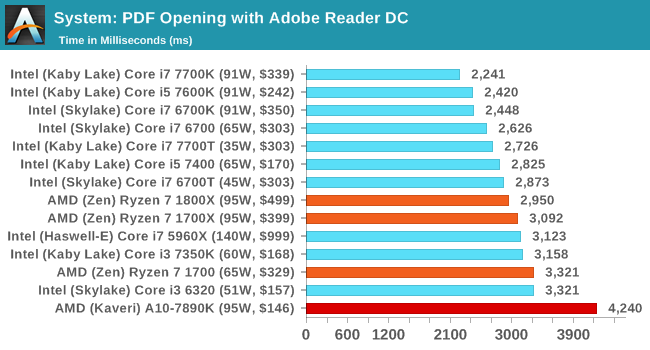
FCAT Processing
One of the more interesting workloads that has crossed our desks in recent quarters is FCAT - the tool we use to measure stuttering in gaming due to dropped or runt frames. The FCAT process requires enabling a color-based overlay onto a game, recording the gameplay, and then parsing the video file through the analysis software. The software is mostly single-threaded, however because the video is basically in a raw format, the file size is large and requires moving a lot of data around. For our test, we take a 90-second clip of the Rise of the Tomb Raider benchmark running on a GTX 980 Ti at 1440p, which comes in around 21 GB, and measure the time it takes to process through the visual analysis tool.
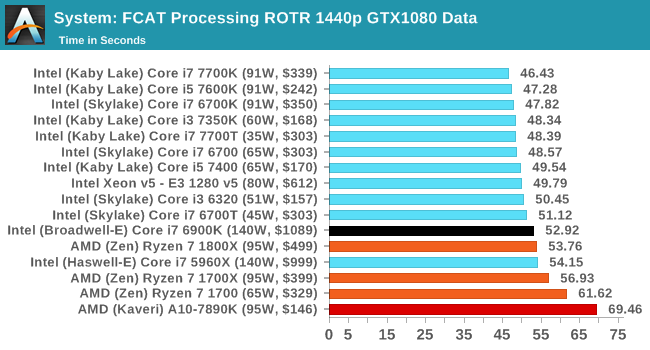
3D Particle Movement v2.1
This is the latest version of the self-penned 3DPM benchmark. The goal of 3DPM is to simulate semi-optimized scientific algorithms taken directly from my doctorate thesis. Version 2.1 improves over 2.0 by passing the main particle structs by reference rather than by value, and decreasing the amount of double->float->double recasts the compiler was adding in. It affords a ~25% speed-up over v2.0, which means new data.
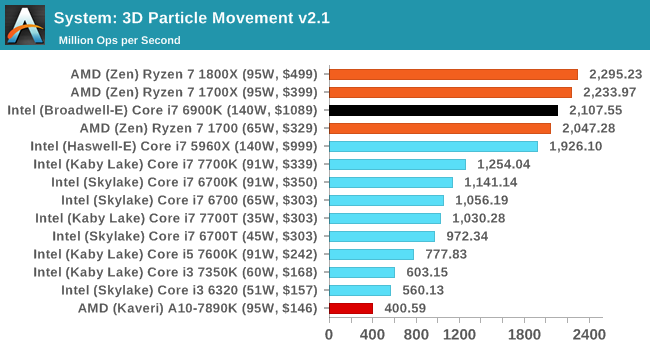
DigiCortex 1.16
Despite being a couple of years old, the DigiCortex software is a pet project for the visualization of neuron and synapse activity in the brain. The software comes with a variety of benchmark modes, and we take the small benchmark which runs a 32k neuron/1.8B synapse simulation. The results on the output are given as a fraction of whether the system can simulate in real-time, so anything above a value of one is suitable for real-time work. The benchmark offers a 'no firing synapse' mode, which in essence detects DRAM and bus speed, however we take the firing mode which adds CPU work with every firing.
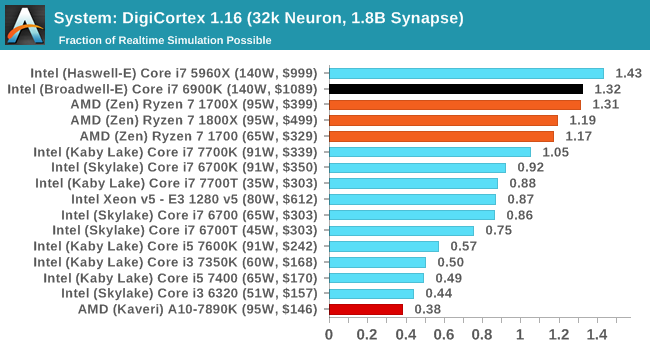
Agisoft Photoscan 1.0
Photoscan stays in our benchmark suite from the previous version, however now we are running on Windows 10 so features such as Speed Shift on the latest processors come into play. The concept of Photoscan is translating many 2D images into a 3D model - so the more detailed the images, and the more you have, the better the model. The algorithm has four stages, some single threaded and some multi-threaded, along with some cache/memory dependency in there as well. For some of the more variable threaded workload, features such as Speed Shift and XFR will be able to take advantage of CPU stalls or downtime, giving sizeable speedups on newer microarchitectures.
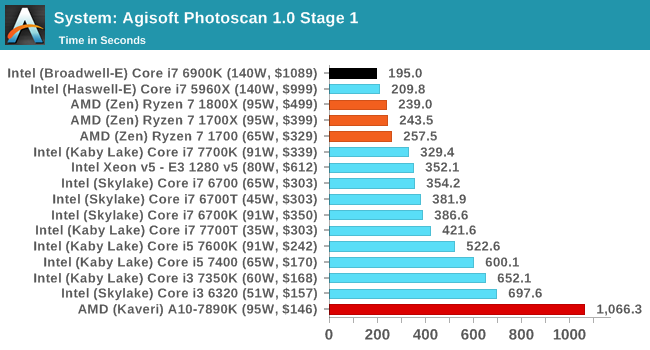
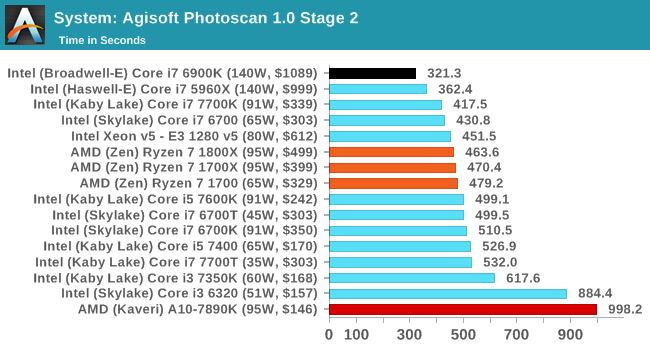
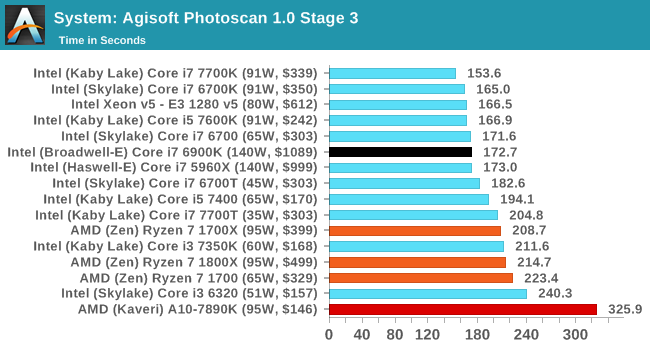
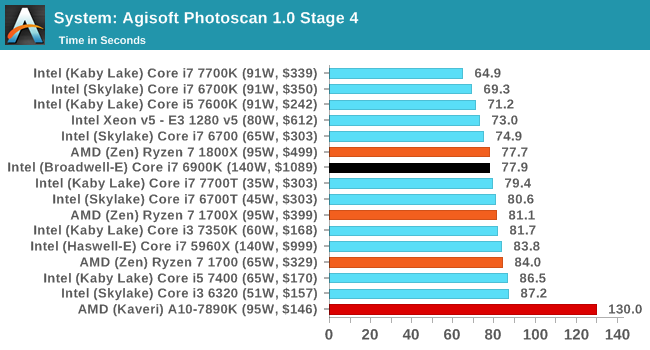
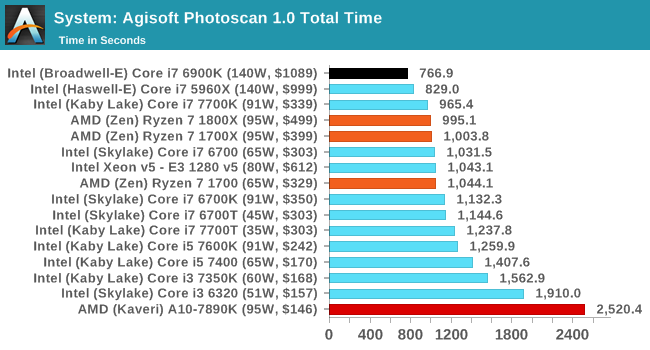










574 Comments
View All Comments
FriendlyUser - Thursday, March 2, 2017 - link
True. The 1600X will be competitive with the i5 at gaming and probably much faster in anything multithreaded. The crucial point is the price... $200 would be great.MrSpadge - Thursday, March 2, 2017 - link
"Ryzen will need to drop in price. $500 1800x is still too expensive. According to this even a 7700k @ $300 -$350 is still a good choice for gamers."That's what the 1700X is for.
lilmoe - Thursday, March 2, 2017 - link
+1And for that, I'd say the 1700 (non-x) is the best consumer CPU available ATM. BUT, if someone just wants to game, I'd say get the Core i5... For me though, screw Intel. Never going them again.
fanofanand - Thursday, March 2, 2017 - link
The 1700 is the sweet spot for anyone not trying to eek out a few more fps or drop their encode/decode times by a couple of seconds. To save $170 and lose a couple hundred mhz, I know which chip seems like the best all-around for price/performance and that's the 1700.lilmoe - Thursday, March 2, 2017 - link
Yep. You get both efficiency and performance when needed. This should allow for super quiet and very performant builds. Just take a look at the idle system power draw of these chips. Super nice.Everything is going either multi-threaded or GPU accelerated, even compiling code. What I'm really waiting for is Raven Ridge. I've got lots of stock $$ and high hopes for a low power 4-6 core Zen APU, with HBM and some bonus blocks for video encode (akin to Quicksync). I have a feeling they'll be much better for idling power and have better support for Microsoft's connected standby.
khanikun - Friday, March 3, 2017 - link
i5 is a good gamer and all around cpu for majority of users. If all you plan to do is game and a tight budget, the i3 7350k is a great cpu for just that. Once the workload goes a bit more multithreaded, that's where you'll want to move to an i5.Valis - Friday, March 3, 2017 - link
I game now and then, but I do a lot of other things too. Video rendering, Crypto coins, Folding @ home, VM, etc. So any Zen, perhaps even 4 Core later thins year with a good GPU will suit me fine. :)nos024 - Thursday, March 2, 2017 - link
So the 1800x is pointless?lilmoe - Thursday, March 2, 2017 - link
I don't think pointless is the right word. I'd say it's the worse value for dollar of the three.tacitust - Thursday, March 2, 2017 - link
Not at all pointless if you do a lot of video transcoding or other CPU intensive tasks well suited to multiple cores. The price premium is still for the 1800x is way lower than the price premium for the Intel processors.